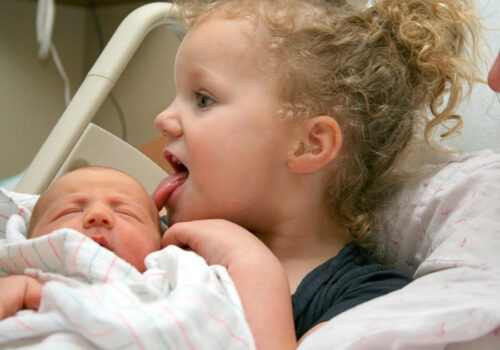Parenting: Never Trust Newborns
Newborns are a worrisome lot
Never Trust A Newborn
First Two Months of Life
by Gregory A. Barrett, M.D.
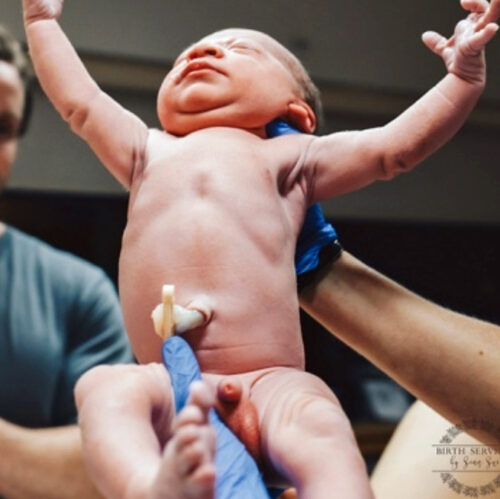
What a terrible thing to say! I mean, really, if you can’t trust a baby, who can you trust? Well, there might be some truth to that, but the point here is that newborns in a medical sense are extremely fragile. Not only may they have any of a wide variety of congenital conditions which don’t necessarily reveal themselves at birth; but, they are also functionally immune deficient. Minor illnesses (colds, intestinal viruses) can develop into major problems.
And above and beyond that, they are exceptionally vulnerable to the acquisition of much more serious diseases such as meningitis, pneumonia, and sepsis. During the newborn period, defined medically as the first two months of life, there is simply no issue which can safely be considered trivial. Concerns which may seem minor to the parent – a strange rash, a different color or intensity of vomiting, or a slight fever – could be of vital importance to the infant’s health. And conversely many other symptoms which the baby’s mother or father feel are of great significance might actually be quite benign and normal. But one must always keep the index of suspicion high and never be afraid to question.
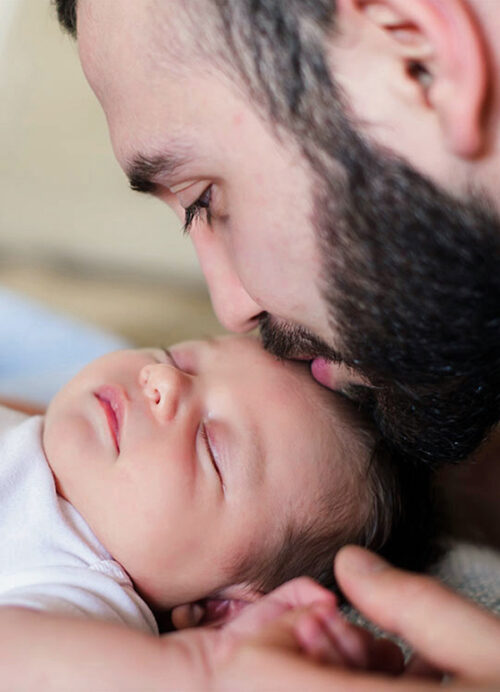
During this time frame great caution is encouraged. Kissing and close contact with a newborn baby should be STRICTLY RESTRICTED to noninfectious close friends and important relatives – i.e. those who are not manifesting a fever, a productive cough, an active cold sore, or any other symptoms which imply potential contagiousness. Note that other children are not specifically included as persons to be avoided. It always astonishes me how so many parents naively assume anyone under the age of ten is a germatologic cesspool whereas good old Uncle Ralph with his sixty-pack-year history of smoking and his chronic bronchitis can be allowed to slobber on the defenseless infant at will. It must be some sort of reverse form of age discrimination, don’t you think?
Now, this does not mean to imply that a baby needs to be kept inside a plastic bubble for the first eight weeks of life. Au contraire, the atmosphere inside their bedroom isn’t necessarily any healthier or more sacred than fresh air. A stroller ride around the block or a trip to the store can do everybody a world of good during this period, including the baby him- or herself. A little stimulation shouldn’t hurt anyone so, yes, you can go to churches, malls, restaurants, bowling alleys, et cetera, accompanied by your infant, as long as you remember not to rely on the common sense of others and maintain your role as policeman. Babies are charismatic little creatures and apparently the impulse to venture inside an acceptable range and infect them proves irresistible to many otherwise clear-thinking adults. You have multiple roles as new parents – to feed, to shelter, to love, and to assure your infant that he or she is living in a secure environment inhabited by people who would instinctively throw themselves in front of a bus without a second’s hesitation if necessary to save them from harm. And protecting the baby from harm also means using appropriate discretion regarding exposures.
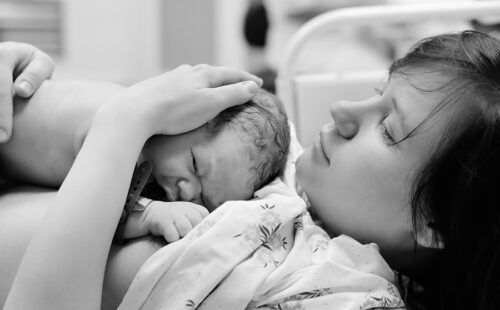
Learning how to discriminate between the important and the not-so-important is a critical challenge for new parents. To aid in this process I have developed the following to assist parents in identifying those common conditions which can be concerning but are not true indicators of an underlying problem.
I call it my Imaginary List…
EIGHTY-SEVEN WEIRD THINGS ABOUT A NEWBORN WHICH SEEM STRANGE BUT IS ACTUALLY NORMAL
I’d like to share a sampling of these so you can get a feel for the process. For moms and dads whose children have already passed this stage perhaps a few will bring back some memories, and for those among you who have yet to start your parenting adventure consider yourselves somewhat prepared. At any rate, here’s a random sampling:
#1 Sneeze
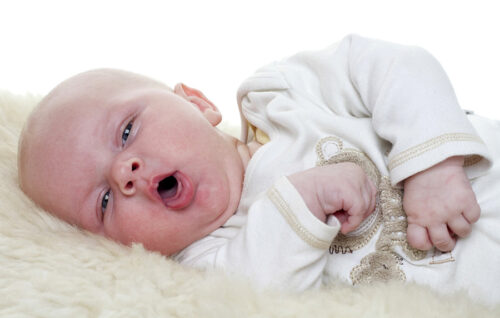
Yep, they all sneeze. This is due to the fact that newborns are obligate nose breathers. Don’t try this at home, but if you pinch an infant’s nose shut he or she will turn blue. And when it comes to babies a basic principle to remember is that blue is bad. Now, should you or I should happen to sneeze the thinking would be either cold or allergy, but generally speaking in the early months of life these aren’t even diagnostic considerations. A sneeze is merely the clearing of dust particles trapped inside their tiny nasal passages, nothing more. Gezundheit.
#2 Hiccough
It is true, newborns sneeze and hiccough more often than you could possibly imagine. That same baby who was hiccoughing on the inside of its mother is now hiccoughing on the outside. These spasms are not seizures but basically nothing more than convulsive contractions of the diaphragm, the big muscle which separates the lungs from the abdomen. Literally hundreds of utterly worthless therapeutic remedies are sitting out there just waiting to be suggested, but recognize a hiccoughs for it is and be patient. Hiccoughs pass. They always do.
#8 The yellow stool
Although present in all babies, this particular type of bowel movement is especially common in the breast fed infant, what my daughter referred to as her little brother’s “mustard poo.” They are typically fairly frequent due to the newborn’s gastrocolic reflex whereby filling the stomach with human milk leads to a contraction of the colon and the passing of feces with each feeding. Babies generally lose this reflex at around two months of age and go in a completely different direction, switching gears virtually overnight to passing a soft stool only once about every three to five days. Equally harmless, but that’s a story for another day.
#19 Baby acne
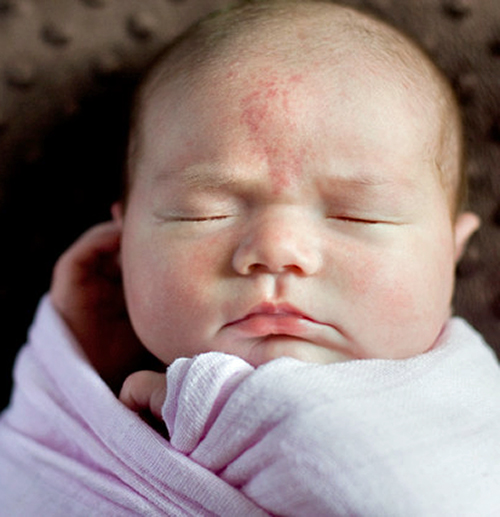
The mother’s sex hormone levels at birth are sky-high and the newborn baby responds to this rush of hormones, the highest he or she will experience until puberty, with pimples showing up on the face and trunk at around a couple weeks of age. No effective treatment is available or required here, only the passage of time. And the presence or absence of this outbreak does not seem to forecast with any predictability the degree of adolescent acne the child will experience years later, so don’t worry yourself prematurely.
#20 Swollen breasts
This is especially common in full-term babies. Rarely it can progress to mastitis, an infection of the neonatal breast tissue typified by tender, warm, well-demarcated redness and swelling around the nipples. The best way to avoid this complication is to leave them alone.
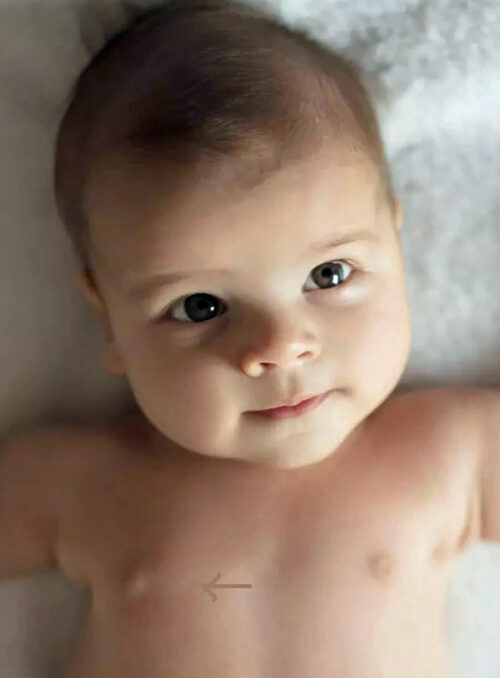
DO NOT squeeze out the “witch’s milk,” as it was referred to once upon a time, from the enlarged infant breasts (a pretty loony idea in the first place, in my opinion).
#21 Vaginal bleeding
The menstrual period in an adult woman is caused by an abrupt decrease in sex hormones leading to withdrawal bleeding from the lining of their uterus. Well, the identical phenomenon occurs in the newborn girl at the moment the cord is clamped and can result in vaginal bleeding occurring at about a week of age. Freaks parents out every time, and who can blame them?
#25 Green stools
The waste product of the liver, a sludge called bile, is stored temporarily in the gall bladder awaiting excretion into the intestine. Periodically the G.B. contracts and the stool as a consequence of the presence of this bile turns fluorescent green. Very colorful, very common, and very normal…
#33 Periodic breathing of infancy
Alert parents will occasionally pick up on this particularly peculiar and disturbing phenomenon. An older child or adult’s breathing pattern is like a metronome, inhaling and exhaling in a steady rhythm influenced only by extraneous factors such as exercise, excitement, sleep, or boredom. The infant’s respiratory pattern, on the other hand, shifts randomly between rapid, labored, and noisy and slow, shallow. It will be the episodes of heavy breathing which catch the observant parent’s attention, but as long as they resolve spontaneously periodic breathing makes the list as yet another weird but normal aspect of newborns.
#36 Stork bites and angel kisses
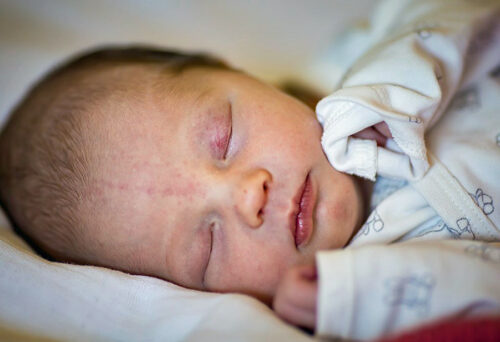
These are our nicknames for those flat red discolorations on the back of the neck (the former) and the eyelids and forehead (the latter). Cute, huh? They, along with their big brother, the raised, strawberry-looking lump called the hemangioma, follow a similar natural history of either staying the same or becoming more prominent up until around the first birthday and then starting the process of involution. About ninety-five percent of these birthmarks will eventually vanish altogether or fade to such a degree that the only person left who will notice it will be the child’s mother.
#37 Normal nasal congestion of the newborn
I first heard this expression used by a doctor from the U.K. and it sounded really cool when spoken with a British accent. As mentioned previously in the section on sneezing the majority of air movement in babies travels through their small, narrow nasal passages. As a result of this, and all the resultant grime which gets trapped causing additional inflammation and swelling, many babies sound chronically snorty. The nasal aspirator combined with saline nose drops is readily available but babies absolutely hate this intervention and more often than not it won’t offer much relief. As long as the color is good and there doesn’t appear to be any labored breathing it’s often best to simply leave well enough alone.
#40 Erythema toxicum
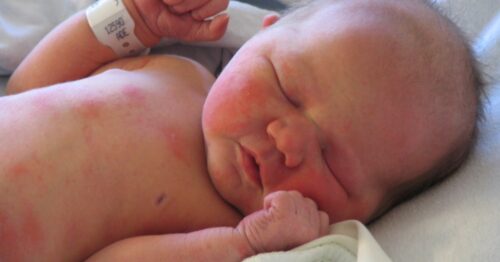
Or E.T., for short. By the way, we pediatricians were calling this newborn rash E.T. years before Mr. Spielberg made his famous movie. Erythema toxicum is that strange rash with tiny pinpoint blisters superimposed on a larger red base which shows up between the second and tenth day of life and can appear to comprise over 80% of a newborn’s land mass. It is completely unrelated to any other condition or disease entity and resolves without intervention.
#47 Vaginal discharge
The cheesy, white stuff you notice during diaper changes of your daughter is not pus or infection, it’s nature’s vaseline providing a protective element to her unestrogenized raw vaginal mucosa. It isn’t proper hygiene or in your baby’s best interest to compulsively scrape all of it away with every changing. A light wipe of the area from front to back is all that’s necessary. Otherwise, leave it.
#51 Crossed eyes
Babies occasionally appear to be gazing at their nose and at other times, courtesy of fairly severe nearsightedness (the visual acuity of a typical newborn is estimated to be about 20/400), they aren’t really looking at much of anything. It is inevitable that their eyes will sometimes cross but as long as they aren’t fixed in an abnormal position or it doesn’t persist beyond six months of age it’s probably okay. However, if you do notice this occurring on a fairly regular basis do make sure you mention it to their doctor.
#52 Burping (and lack thereof)
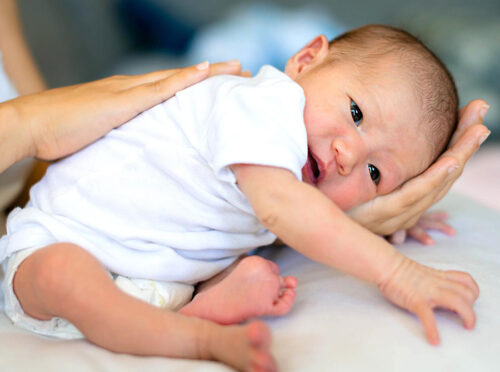
There will be few things in the life of a parent which yields more visceral satisfaction than rapping on a baby’s back with the palm of one’s hand and being rewarded with a ninety-decibel eruption of air. The residual glow from accomplishing this feat will linger for hours. But, tragically, every so often the mother or father will be unable to achieve this triumph leaving them nearly apoplectic with frustration. In reality a burp is actually nothing more than ridding of swallowed air acquired via the act of feeding. It is an unfortunate fact that although there is air inside a bottle none exists inside a mommy, thus explaining why breast feeders are so notoriously poor at eructation. Burping, though admittedly quite gratifying, is somewhat overrated. My advice is to put a limit of one minute on your efforts. If you haven’t succeeded within that time frame then back off, stop all the increasingly frantic pounding and repositioning, and leave your baby alone. If there does happen to be some small amount of residual gas in the stomach it will eventually work itself out on its own. (Another sacred cow slain…)
#54 Brown stools
(What’s with the stool color again?)
#59 Benign infantile tremors
…or BIT’s, for short. This expression refers to those rapid quivering movements of the hands and feet which occur so often and so spontaneously. The concern here is whether this is a convulsion but to any experienced observer tremors are clearly a different lot. A true seizure characteristically has an associated decrease in tone, loss of consciousness, slower rhythm, and/or the inability to stop the movements by flexing the involved extremity. BIT’s are nothing more than an innocent overflow excitation of the immature neurologic system.
#65 Spitting up
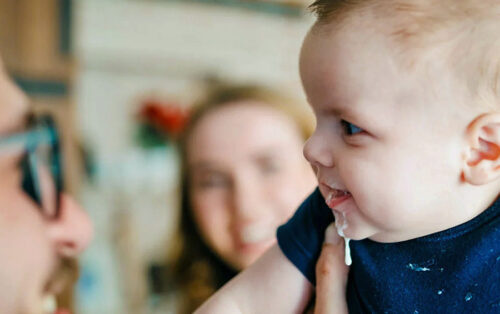
All babies have some degree of reflux caused by a lack of tone in the cardiac sphincter, the valve at the top entrance part of the stomach, which allows ingested food to be regurgitated back up and out the mouth. Big-time refluxers are easy to spot as they wear bibs everywhere they go and their mothers smell faintly of vomitus. I divide the world of vomiting infants into two camps – those who spit up and gain weight and those who spit up and lose weight – and I worry a lot more about the latter than the former. This approach has never steered me wrong. The major reasons to intervene medically would be if the reflux is painful or the amount of amount of vomiting is so massive that the baby is failing to thrive. Otherwise in general GER tends to decrease between six and nine months and resolves by one year.
#66 An outie
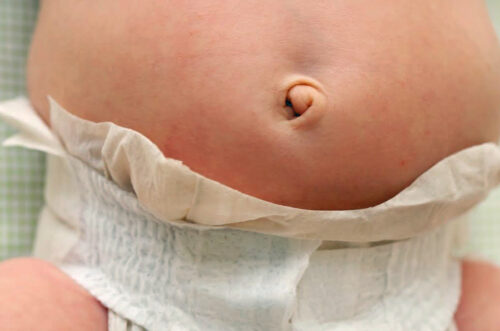
The presence of an umbilical hernia at birth does not mean it will always be there as the closure of the muscles of the abdomen is a dynamic event beginning in utero and often not completed until much later. These hernias are essentially harmless and can electively be closed by a surgeon at some agreed upon point in time primarily for cosmetic reasons. The only long-term consequence of this anatomic variant is that it’s an absolute contradiction to the ever-popular belly button piercing. Tragic, huh?
#68 The black stool
Sigh….
#70 Effluvium
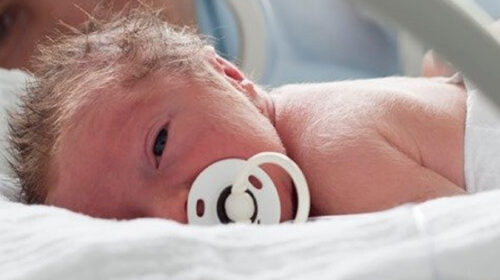
I believe this must be either Greek or Latin for the fine, delicately attached lanugo hair on a newborn’s head thinning and falling out in the first few months of life. Do not despair, parents, newer, improved hair will soon grow back to replace it. And if it doesn’t happen for a while, what the heck, everyone knows bald babies are cuter anyway, right?
#75 The soft spot
Pediatricians love the fontanelle! How cool is it that babies are born with a pressure gauge conveniently located right on the top of their heads readily available for us to assess? A wonderful design, in my opinion. Personally, I feel it is a darned shame it closes between six and twenty-four months of age. And do not be psyched out, parents, the skull underneath is much sturdier than you think. Learn to embrace the soft spot and enjoy it while it lasts. The fontanelle is your friend.
#83 The orange stool
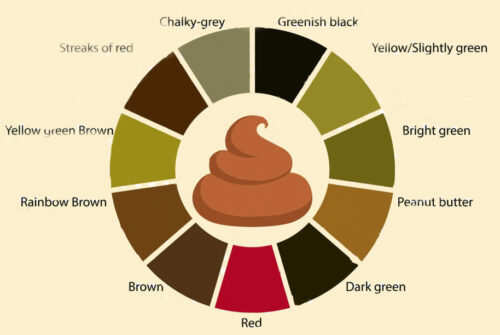
Okay, okay, so what’s going on here? It’s time to let you readers in on a trade secret. The only two stool colors which concern us are red and white – the former indicating blood, the latter possibly an issue with the liver – whereas all others will be interpreted as normal.
Bowel movements of a newborn can be depended upon to change in color, consistency, and frequency; so, unless the pattern gets really persistently out of whack for an extended period of time, in one specific direction, learn to go with the flow. Also, be aware that the color of vomit which grabs our attention is green. Bilious vomiting represents an obstruction in the intestines on the far side of the bile duct until proven otherwise. This is a very ominous sign at any age, but particularly in a newborn. So, there you go – red, white, and green, like the Italian flag. That should be easy enough to remember.
Newborn Twins

I hope these examples have been sufficient to make the point. There are at least eighty-seven such phenomena and I seem to still add new ones to my Imaginary List about every other day. It is indeed a difficult task for parents to identify and assimilate so many of these but if they have good resources – an experienced older hand nearby to support them, a good book or, most importantly, an open line of communication to the pediatrician or family doctor – most seem to learn and adapt fairly quickly.
One might falsely assume by the mere nature of the length of the list that EVERYTHING which happens to a newborn is normal and treatable with mere reassurance, but nothing could be further from the truth.
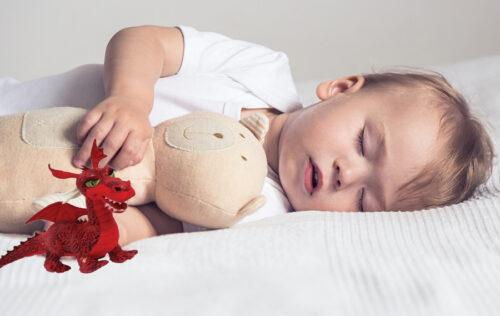
There are monsters lurking out there disguised in the most innocent of garb. A specific type of vomiting pattern or color could lead to an emergency surgical intervention, listlessness or skipped feedings might indicate the need for a spinal tap, and the most innocuous of rashes may necessitate an evaluation and treatment for a serious infection. So, stay alert and let us try to help you separate the grain from the chaff.
In summary, there is certainly a lot of weird stuff going on in the first two months of life that new parents must learn to recognize and accept as normal. And this is only the beginning. Having a child encompasses many things but not the least of which is an education. Pretty soon, however, it is you, the parent, who becomes the local expert, the person who knows their child better than anyone else alive, and the doctor will need to respect your insights. But let me add one additional concept of parenting which is critically important to understand at all ages: You don’t have to know what’s wrong with your child. That is not your job. You just have to know something is wrong. The rest is up to us.
The first two months of life are a minefield. Traverse this period with great care; a healthy degree of paranoia is strongly recommended. Yes, it is true what they say about newborns – they’re cute, sweet, cuddly, innocent, and absolutely adorable.
But always remember, they are not to be trusted.
☤

